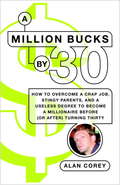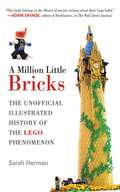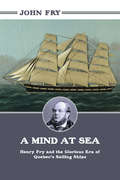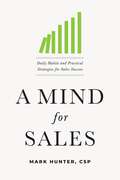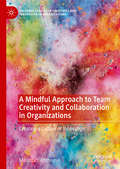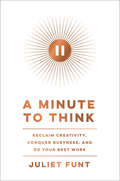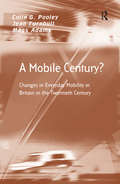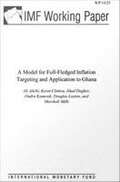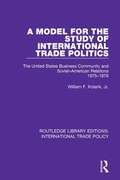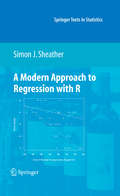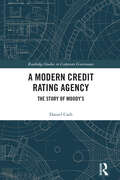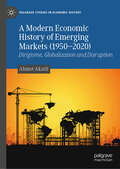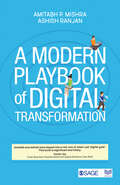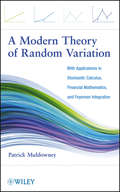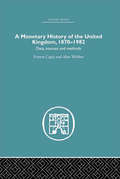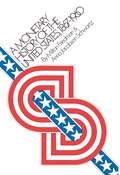- Table View
- List View
A Millennial View of Spain’s Development: Essays in Economic History (Frontiers in Economic History)
by Leandro Prados de la EscosuraThis open access book presents the evolution of the Spanish economy over the past seven centuries since the end of the Reconquest and examines how much economic progress has Spain achieved, as well as its impact on living standards and income distribution over the very long run. It shows that preindustrial Spain was far from stagnant, although levels of output per head in the early nineteenth century were not much different from those on the eve of the Black Death (1348). It further discusses how phases of simultaneous per capita output and population expansion and shrinkage alternated, lending support to the recurring growth and frontier economy hypotheses. While a collapse in the 1570s gave way to sluggish growth and higher inequality after a long phase of sustained growth and lower inequality, the book shows how real per capita income has improved substantially over the last two centuries, driven by increased labor productivity, and derived from more intense andefficient use of physical and human capital per worker. Presenting exposure to international competition as a stimulus for this development, the book sheds light on the underperformance of Spain up to 1950 in a European comparison and describes the catch-up of Spain’s economy with more advanced countries until 2007. Finally, the book explains how modern economic growth is associated with an increase in the material well-being of its inhabitants, as the most dynamic economic phases of the last century have been associated with an improvement in income distribution, although the relationship between growth and inequality has not been linear. This book is a must-read for students, researchers, and scholars of economics and economic history interested in a better understanding of cliometrics, long-run analyses, economic development, economic growth, as well as the Spanish economy.
A Million Bucks by 30
by Alan CoreyAt twenty-two, Alan Corey left his mom's basement in Atlanta and moved to New York City with one goal in mind: to become a millionaire by the time he was thirty. His parents and friends laughed, but six years later they were all celebrating his prosperous accomplishment-at a bar Corey owned in one of Brooklyn's hippest neighborhoods.No, Corey didn't climb the corporate ladder to build his fortune. In fact, he worked the same entry-level 9-to-5 job for six years straight. But by pinching his pennies and making sound investments, he watched a pittance blossom into a seven-digit bank account. In A Million Bucks by 30, Corey recounts his rags-to-riches journey and shares his secrets to success. WARNING: DO NOT ATTEMPT TO USE THIS BOOK UNLESS YOU ARE PREPARED TO BECOME FILTHY RICH."What a steal . . . For any entrepreneur the advice in these pages is worth more than a million bucks."-Barbara Corcoran, founder, The Corcoran Group"This is the best personal finance book I've ever read. Part self-help, part brass-tacks money guide; Corey's confessional tales of making it to the million dollar mark are as hilarious as they are helpful."-John Reynolds, writer, The Late Late Show with Craig FergusonFrom the Trade Paperback edition.
A Million Little Bricks: The Unofficial Illustrated History of the LEGO Phenomenon
by Sarah HermanToy of the Year, Toy of the Century, Greatest Toy of All Time . . . there aren't many titles that haven't been bestowed on LEGO toys, and it's not hard to see why. From its inception in the early 1930s right up until today, the LEGO Group's history is as colorful as the toys it makes. Few other playthings share the LEGO brand's creative spirit, educative benefits, resilience, quality, and universal appeal. The LEGO name is now synonymous with playtime, but it wasn't always so. This history charts the birth of the LEGO Group in the workshop of a Danish carpenter and its steady growth as a small, family-run toy manufacturer to its current position as a market-leading, award-winning brand. The company's ever-increasing catalogof products-including the earliest wooden toys, plastic bricks, play themes, and other building systems such as DUPLO, Technic, and MINDSTORMS-are chronicled in detail, alongside the manufacturing process, LEGOLAND parks, licensed toys, and computer games. Learn all about how LEGO pulled itself out of an economic crisis and embraced technology to make building blocks relevant to twenty-first-century children and discover the vibrant fan community of kids and adults whose conventions, websites, and artwork keep the LEGO spirit alive. As nostalgic as it is contemporary, A Million Little Bricks will have you reminiscing about old Classic Space sets, rummaging through the attic for forgotten Minifigure friends, and playing with whatever LEGO bricks you can get your hands on (even if it means sharing with your kids).
A Mind at Sea: Henry Fry and the Glorious Era of Quebec's Sailing Ships
by John FryThe trials and tribulations of a Canadian business titan during a fascinating period in 19th-century Quebec. A Mind at Sea is an intimate window into a vanished time when Canada was among the world’s great maritime countries. Between 1856 and 1877, Henry Fry was the Lloyd’s agent for the St. Lawrence River, east of Montreal. The harbour coves below his home in Quebec were crammed with immense rafts of cut wood, the river’s shoreline sprawled with yards where giant square-rigged ships – many owned by Fry – were built. As the president of Canada’s Dominion Board of Trade, Fry was at the epicentre of wealth and influence. His home city of Quebec served as the capital of the province of Canada, while its port was often the scene of raw criminality. He fought vigorously against the kidnapping of sailors and the dangerous practice of deck loading. He also battled against and overcame his personal demon – mental depression – going on to write many ship histories and essays on U.S.-Canada relations. Fry was a colourful figure and a reformer who interacted with the famous figures of the day, including Lord and Lady Dufferin, Sir John A. Macdonald, Wilfrid Laurier, and Sir Narcisse-Fortunat Belleau, Quebec’s lieutenant-governor.
A Mind for Sales: Daily Habits and Practical Strategies for Sales Success
by Mark Hunter, CSPFor salespeople feeling stressed and disappointed that their customers don&’t want to hear from them, this guide is the key to developing the mindset and habits required to reach a new level of sales success.The world of sales can be tough, so it&’s easy to get discouraged when the rejections start piling up and your customers stop answering the phone. This allows the wrong thought patterns to start developing, soon you aren&’t making quotas and then you begin looking at job listings waiting for your next downfall.Sales expert Mark Hunter can relate as his start to sales was discouraging. The lessons he&’s learned throughout his career are revealed in A Mind for Sales. He discovered that sales can be incredibly rewarding, such as customers calling you for advice, thanking you for improving their business, and referring you to colleagues. The difference is simply developing mindset and momentum habits.In A Mind for Sales, you&’ll learn how to:Feel energized by renewed purpose and success in your sales role by following the success cycle approach.Receive practical strategies on how to change your mindset and succeed in sales.Learn the daily habits needed to maximize productivity and make hitting the ground running strategy #1.Gain real-world insights from Hunter&’s vast experience as a successful sales professional and sales coach.Let this book inspire and prepare you to form the new habits you need to succeed and to realize the incredible rewards that a successful life in sales makes possible.
A Mindful Approach to Team Creativity and Collaboration in Organizations: Creating a Culture of Innovation (Palgrave Studies in Creativity and Innovation in Organizations)
by Melinda J. RothouseThis book examines how contemplative arts practice and a mindful approach to creativity, can be used to offer new possibilities for facilitating team creativity and collaboration in organizational settings. The author employs a qualitative, action research paradigm, using arts‐based and ethnographic methods, to explore the perceived effects of a contemplative arts workshop process on team creativity and collaboration within an organization. The book demonstrates how a contemplative arts workshop process may be used to facilitate mindfulness, trust, communication, collaboration, and creative insights among teams and working groups. It explores each of these themes in depth and develops a model based on those findings. The model includes five elements: 1. Individual-Level Mindfulness, 2. Trust and Authentic Communication, 3. Team Cohesion and Collaboration, 4. Creative Ideation and Insights, and 5. Leadership: Creating a Culture of Innovation. Combining theory and practice, the book offers a series of mindfulness and contemplative arts exercises that facilitators can use to address each of the five levels of the model. This book weaves together contemporary psychological research on mindfulness and organizational creativity along with practical applications and contemplative arts exercises for practitioners and scholars of workplace creativity, management and organisational and industrial psychology.
A Minute to Think: Reclaim Creativity, Conquer Busyness, and Do Your Best Work
by Juliet Funt“You’re going to want to share copies of this book with your overbooked friends and colleagues, but before you do, take some time to read it yourself. Funt’s wisdom around making space is priceless.” —Seth Godin, author of The PracticeDo you wish you could stop the mayhem of work and life and just take a minute? Do you sense you could contribute more if there were a little more room in the day? Does busyness deprive you and your burnt-out team of the oxygen your talents need to catch fire?Many have felt that way, yet taking a pause has seemed impossible—until now.In A Minute to Think, Juliet Funt, a globally recognized warrior in the battle against busyness, provides a powerful guide that will give you the permission, framework, and specific direction you need to do the following:Regain control of your overloaded, caffeinated, inbox-worshiping workdayLiberate yourself and your teams from burnout and busyworkReclaim creativity and focus despite the chaos around youBring thoughtfulness into designing your next work normsTame the beast of email and escape the mire of meetingsFind your precious minute to thinkYou’re not alone in your yearning for freedom from constant reactivity. The global workforce today is so fried that it belongs in the food court of a county fair. We’re relentlessly behind the curve, dousing fires everywhere, and our 3 a.m. insomnia provides the only unscheduled thinking time of the day.What we need reinserted in our lives is the missing element of white space—short periods of open, unscheduled time that, when recaptured, change the very nature of work. White space is the stepping back, the strategic pause, the oxygen that allows the sparks of our efforts to catch fire. White space has the power to radically—and simply—reinvent the way we approach work in this maxed-out, post-COVID 21st-century world.With Juliet’s memorable stories, easy-to-use tools, and razor-sharp instruction, she carves for us an escape route from the overwhelming amount of low-value tasks and the daily avalanche of e-mails, meetings, decks, and reports. Using research, client stories, and a relatable voice, Juliet shows all of us how to reclaim time for thinking and make room for what truly matters. Whether you are an individual trying to build a more sane and humane flow of daily work, a team that wants new levels of efficiency and effectiveness, or an entire organization changing your culture toward thoughtfulness, this book will lead you there.
A Mobile Century?: Changes in Everyday Mobility in Britain in the Twentieth Century (Transport and Mobility)
by Colin G. Pooley Jean Turnbull Mags AdamsFor most people in the developed world, the ability to travel freely on a daily basis is almost taken for granted. Although there is a large volume of literature on contemporary mobility and associated transport problems, there are no comprehensive studies of the ways in which these trends have changed over time. This book provides a detailed empirical analysis of mobility change in Britain over the twentieth century. Beginning with an explanatory theoretical overview, setting the UK case studies within an international context, the book then analyses changes in the journey to school, the journey to work, and travelling for pleasure. It also looks at the ways in which changes in mobility have interacted with changes in the family life cycle and assesses the impact of new transport technologies on everyday mobility. It concludes by examining the implications of past mobility change for contemporary transport policy.
A Model for Full-Fledged Inflation Targeting and Application to Ghana
by Ali Alichi Douglas Laxton Jihad Dagher Ondra Kamenik Kevin Clinton Marshall MillsA report from the International Monetary Fund.
A Model for the Study of International Trade Politics: The United States Business Community and Soviet-American Relations 1975-1976 (Routledge Library Editions: International Trade Policy #15)
by William F. Kolarik, Jr.Together with efforts to control the arms race, commercial issues were a central feature of relations between the United States and the Soviet Union in the 1970s. There was a clear recognition that trade and economic issues were of key importance to political relations. This book, first published in 1987, is a comprehensive analysis of the views and perceptions held by Soviet Area Executives of US ‘trade actor’ companies in the critical years 1975-76. It focuses on the key issues of overall US-Soviet relations which formed the environment for commercial relations between the superpowers.
A Model of Multiple Equilibria in Geographic Labor Mobility
by Antonio Spilimbergo Luis UbedaA report from the International Monetary Fund.
A Model of Sovereign Debt in Democracies
by Ali AlichiA report from the International Monetary Fund.
A Moderate Compromise
by Steven SuranovicLooking at all sides of the globalization debate, this book analyzes how international economic policy is made and how it has become so controversial. The author offers a solution to the debate between free trade/unregulated markets and the push for greater government involvement that is consistent with both economic efficiency and social justice
A Modern Approach to Regression with R (Springer Texts in Statistics #Vol. 58)
by Simon SheatherThis book focuses on tools and techniques for building valid regression models using real-world data. A key theme throughout the book is that it only makes sense to base inferences or conclusions on valid models.
A Modern Credit Rating Agency: The Story of Moody’s (Routledge Studies in Corporate Governance)
by Daniel CashThis book aims to present a picture of one of the world’s leading credit rating agencies. Credited as being the first credit rating agency, Moody’s stands as the epitome of the rating sector and all that it effects. However, outside of internal and non-public histories compiled within the rating agency itself, the story of Moody’s has never been told, until now. However, this is not a historical book. Rather, this book paints a picture of Moody’s on a wider canvas that introduces the concept of rating to you, taking into account the origins of the sector, the competitive battles that formed the modern-day oligopoly, and the characters that have each taken their turn on sculpting the industry that, today, is critical to the modern economy. The book is a story of personable people who provided the market with what it needed, but it is more than that. It is a story of conflict, impact, strategy, and most of all the relationship between big business and modern society. Standing as the gatekeeper to the capital markets that form the core of modern society, Moody’s represents the very best of what the marketplace can produce, but also the very worst. This story takes in economic crises in the antebellum US, the Panics of the early 1900s, the Wall Street Crash and the Great Depression and, of course, the Global Financial Crisis. It does this because, at the heart of each one was a member of the rating industry or the reporting industry that preceded it. Associated with almost any financial scandal you may care to remember the credit rating agencies, in their often-uncomfortable role as gatekeepers, have their fingerprints on most financial scandals and calamities. This book tells the story of the industry’s founding member.
A Modern Credit Rating Agency: The Story of Moody’s (Routledge Studies in Corporate Governance)
by Daniel CashThis book aims to present a picture of one of the world’s leading credit rating agencies. Credited as being the first credit rating agency, Moody’s stands as the epitome of the rating sector and all that it effects. However, outside of internal and non-public histories compiled within the rating agency itself, the story of Moody’s has never been told, until now. However, this is not a historical book. Rather, this book paints a picture of Moody’s on a wider canvas that introduces the concept of rating to you, taking into account the origins of the sector, the competitive battles that formed the modern-day oligopoly, and the characters that have each taken their turn on sculpting the industry that, today, is critical to the modern economy.The book is a story of personable people who provided the market with what it needed, but it is more than that. It is a story of conflict, impact, strategy, and most of all the relationship between big business and modern society. Standing as the gatekeeper to the capital markets that form the core of modern society, Moody’s represents the very best of what the marketplace can produce, but also the very worst. This story takes in economic crises in the antebellum US, the Panics of the early 1900s, the Wall Street Crash and the Great Depression and, of course, the Global Financial Crisis. It does this because, at the heart of each one was a member of the rating industry or the reporting industry that preceded it. Associated with almost any financial scandal you may care to remember the credit rating agencies, in their often-uncomfortable role as gatekeepers, have their fingerprints on most financial scandals and calamities. This book tells the story of the industry’s founding member.
A Modern Economic History of Emerging Markets: Dirigisme, Globalization and Disruption (Palgrave Studies in Economic History)
by Ahmet AkarliThis book offers a comprehensive economic history of emerging market economies post-WWII and identifies a complex web of sustainability problems that face the EMEs going forward. It seeks to present a truly global perspective on the development of EMEs and the long-term trends that have brought EMEs to a critical economic juncture. The first section of the book charts how EMEs became tightly integrated into the global economy at rapid pace, analysing economic achievements as well as imbalances and sustainability issues that have been generated over time. It considers how EMEs have withstood episodes of complex structural transitions and financial shocks, and offers comparative perspectives on patterns of dispersion within the EME landscape from the end of WWII to the present. The second part of the book seeks to understand how EMEs might cope with the volatility brought about by a new ‘age of disruption’ defined by major structural challenges to the neo-liberal economic order. It considers which EMEs are best positioned to respond to issues of economic inequality, financial excess, technological disruption and climate change, what a global historical understanding of the EMEs can offer to policymakers, and the impact on the EME investment landscape. This book will be of interest to a broad audience including researchers of economic history and political economy, as well as policymakers, investment professionals, and the general reader interested in global economic development.
A Modern Nordic Saga: Politics, Economy And Society
by Ryszard M. CzarnyThis book focuses on the Nordic countries through a European perspective and wishes to draw attention to their place in the new world order. The volume emphasizes the specificity of their cooperation within the region itself as well as within the European Union, and stresses the importance of the Nordic region as an area of possibilities and tangible chances resulting from the challenges of globalization. The social, cultural, political and economic dimensions of these countries are characterized by cooperation among states, their collaboration with other regional organizations and within international projects, as well as exchange of viewpoints on the specificity of the current Norden issues. The cooperation of the Nordic countries and their inhabitants as well as migrations between the Scandinavian states have been a trademark of the common and shared history of Norden.
A Modern Playbook of Digital Transformation
by Amitabh P. Mishra Ashish RanjanIn order for successful business transformation to occur, there’s an inner transformation that must happen. The innumerable professional forces that tug pell-mell from every imaginable quarter, need to be organized and personal demons exorcized or at least managed. This book takes you through the transformative journey of Dillon, the presumptive head of Digital in one of the world’s largest footwear manufacturers, his private and professional struggle and victory. This modern parable answers the quintessential question: What makes a leader great? Read the step-by-step digital transformation execution plan, complete with tools, artefacts, lessons, pitfalls to avoid and best practices from the industry. If you’ve ever wished for a book that didn’t shy away from delving into the ‘how’ of the execution journey, and while doing so took you on an enjoyable roller coaster ride, look no further. Grab this!
A Modern Theory of Random Variation
by Patrick MuldowneyA ground-breaking and practical treatment of probability and stochastic processes A Modern Theory of Random Variation is a new and radical re-formulation of the mathematical underpinnings of subjects as diverse as investment, communication engineering, and quantum mechanics. Setting aside the classical theory of probability measure spaces, the book utilizes a mathematically rigorous version of the theory of random variation that bases itself exclusively on finitely additive probability distribution functions. In place of twentieth century Lebesgue integration and measure theory, the author uses the simpler concept of Riemann sums, and the non-absolute Riemann-type integration of Henstock. Readers are supplied with an accessible approach to standard elements of probability theory such as the central limmit theorem and Brownian motion as well as remarkable, new results on Feynman diagrams and stochastic integrals. Throughout the book, detailed numerical demonstrations accompany the discussions of abstract mathematical theory, from the simplest elements of the subject to the most complex. In addition, an array of numerical examples and vivid illustrations showcase how the presented methods and applications can be undertaken at various levels of complexity. A Modern Theory of Random Variation is a suitable book for courses on mathematical analysis, probability theory, and mathematical finance at the upper-undergraduate and graduate levels. The book is also an indispensible resource for researchers and practitioners who are seeking new concepts, techniques and methodologies in data analysis, numerical calculation, and financial asset valuation. Patrick Muldowney, PhD, served as lecturer at the Magee Business School of the UNiversity of Ulster for over twenty years. Dr. Muldowney has published extensively in his areas of research, including integration theory, financial mathematics, and random variation.
A Modest Book About How to Make an Adequate Speech
by John-Paul Flintoff<p>"Where I come from, where modesty is a sin, Flintoff 's book would be called 'The Indispensable Guide to Giving an Unforgettable Speech'." Jay Heinrichs, New York Times bestselling author<p> <p>Most of us dread public speaking. But at some point we find ourselves forced to make a speech. And we worry: Will my jokes fall flat? What if I freeze? Is it okay to read notes? What if people walk out?<p> <p>This book won't magically transform you into a fast-talking corporate hotshot. But it will show you how to think about public speaking in a new way, and with a spot of luck, you will achieve adequacy. Or better!<p> <p>Drawing on ancient principles of rhetoric and his own entertaining successes and failures on the speech-giving circuit, John-Paul Flintoff provides simple but effective techniques to help you to speak with confidence to any crowd, whether it's a work presentation or a best friend's wedding.<p> <p>Humble but motivating, this is a guide to finding your voice, even if it's a bit croaky at first, and a reassuring affirmation that we all have something to say.<p>
A Monetary History of Norway, 1816–2016
by Øyvind Eitrheim Jan Tore Klovland Lars Fredrik ØksendalThis book provides a broad overview of monetary developments in Norway over the past 200 years, using a rich variety of graphical illustrations based on a unique data set of historical monetary statistics, which will be documented and made available on the Norges Bank website (in English) at http://www. norges-bank. no/en. Throughout the book, Norway's monetary developments are anchored in a historical context and in the development of monetary thinking. Through their analysis of the historical data, the authors provide new insights and comparisons to other Scandinavian countries, along with an excellent examination of the development and character of the banking and financial system in Norway.
A Monetary History of the United Kingdom: 1870-1982
by Forrest Capie Alan WebberThis book is the culmination of a major research programme on the monetary history of the United Kingdom. This volume contains monetary series ranging from detailed balance sheet material to monetary aggregates such as M3 and are in monthly, quarterly and annual form. The data are drawn mostly from primary sources in the early part of the period and from more accessible published sources for more recent years. Critiques of existing series are given and assessments of the value of different sources are provided. The user should be able to build his/her own series from the basic constituents given here. This sources and assessment of data should be an essential reference to economic historians and applied economists with an interest and use to the students of money and banking and to monetary economists of other countries. This classic book was first published in 1985.
A Monetary History of the United States, 1867-1960 (National Bureau of Economic Research Publications #14)
by Milton Friedman Anna Jacobson SchwartzWriting in the June 1965 issue of theEconomic Journal, Harry G. Johnson begins with a sentence seemingly calibrated to the scale of the book he set himself to review: "The long-awaited monetary history of the United States by Friedman and Schwartz is in every sense of the term a monumental scholarly achievement--monumental in its sheer bulk, monumental in the definitiveness of its treatment of innumerable issues, large and small . . . monumental, above all, in the theoretical and statistical effort and ingenuity that have been brought to bear on the solution of complex and subtle economic issues." Friedman and Schwartz marshaled massive historical data and sharp analytics to support the claim that monetary policy--steady control of the money supply--matters profoundly in the management of the nation's economy, especially in navigating serious economic fluctuations. In their influential chapter 7, The Great Contraction--which Princeton published in 1965 as a separate paperback--they address the central economic event of the century, the Depression. According to Hugh Rockoff, writing in January 1965: "If Great Depressions could be prevented through timely actions by the monetary authority (or by a monetary rule), as Friedman and Schwartz had contended, then the case for market economies was measurably stronger." Milton Friedman won the Nobel Prize in Economics in 1976 for work related to A Monetary History as well as to his other Princeton University Press book, A Theory of the Consumption Function (1957).
A Monetary Policy Model Without Money for India
by Michael Debabrata Patra Muneesh KapurA report from the International Monetary Fund.

